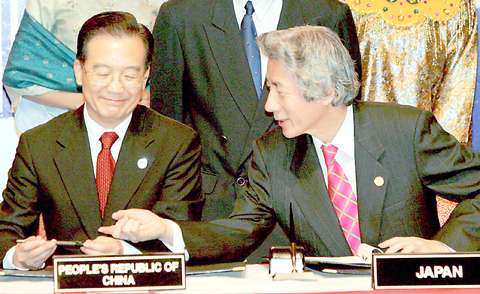Where frosty relations between China and Japan are concerned, the pen is mightier than the sword.
Chinese Premier Wen Jiabao (溫家寶) appeared to make clear his continuing displeasure with Japanese Prime Minister Junichiro Koizumi when he ignored Koizumi's request to borrow his pen at a signing ceremony yesterday at the East Asia Summit in Malaysia.
Wen had already refused to formally meet one-on-one with Koizumi at the summit amid a feud over the Japanese leader's visits to a shrine honoring war dead, including those executed for war crimes committed in China and elsewhere.

PHOTO: EPA
As leaders of the newly inaugurated East Asia Summit were signing a declaration on the group's establishment, Koizumi, seated next to Wen, leaned over and asked to borrow his pen.
Wen ignored him for several seconds until Malaysian Prime Minister Abdullah Ahmad Badawi, smiling broadly, intervened to repeat the request.
Wen then passed the pen to Koizumi with a smile, but the incident was widely noted amid an otherwise uneventful ceremony that concluded the 16-nation summit's formal business.
The snub came just a day after Koizumi said that he failed to understand why Wen had allowed the disagreement to spoil their meeting.
"No two nations are without their share of differences. I cannot understand why China won't have a meeting because of one problem," Koizumi said.
Wen on Monday had said Koizumi was fully responsible for the freeze in high-level contacts because his five visits to Tokyo's Yasukuni shrine while serving as prime minister had "deeply hurt the feelings of the Chinese people."
Wen has ignored most of Koizumi's attempts at affability during the summit's group photos and other public events, although the men did banter about seafood during a luncheon on Monday.
Addressing a news conference later, Abdullah refused to comment on the incident.
"Don't read into body language. I don't want to read into that," Abdullah said.
However, he added, that the China-Japan row had not affected the summit.
"They were participating in the discussions. They were sitting together ... they will sort it out," he said.

FREEDOM OF NAVIGATION: The UK would continue to reinforce ties with Taiwan ‘in a wide range of areas’ as a part of a ‘strong unofficial relationship,’ a paper said The UK plans to conduct more freedom of navigation operations in the Taiwan Strait and the South China Sea, British Secretary of State for Foreign, Commonwealth and Development Affairs David Lammy told the British House of Commons on Tuesday. British Member of Parliament Desmond Swayne said that the Royal Navy’s HMS Spey had passed through the Taiwan Strait “in pursuit of vital international freedom of navigation in the South China Sea.” Swayne asked Lammy whether he agreed that it was “proper and lawful” to do so, and if the UK would continue to carry out similar operations. Lammy replied “yes” to both questions. The

‘OF COURSE A COUNTRY’: The president outlined that Taiwan has all the necessary features of a nation, including citizens, land, government and sovereignty President William Lai (賴清德) discussed the meaning of “nation” during a speech in New Taipei City last night, emphasizing that Taiwan is a country as he condemned China’s misinterpretation of UN Resolution 2758. The speech was the first in a series of 10 that Lai is scheduled to give across Taiwan. It is the responsibility of Taiwanese citizens to stand united to defend their national sovereignty, democracy, liberty, way of life and the future of the next generation, Lai said. This is the most important legacy the people of this era could pass on to future generations, he said. Lai went on to discuss

AMENDMENT: Climate change is expected to increase the frequency of high-temperature days, affecting economic productivity and public health, experts said The Central Weather Administration (CWA) is considering amending the Meteorological Act (氣象法) to classify “high temperatures” as “hazardous weather,” providing a legal basis for work or school closures due to extreme heat. CWA Administrator Lu Kuo-chen (呂國臣) yesterday said the agency plans to submit the proposed amendments to the Executive Yuan for review in the fourth quarter this year. The CWA has been monitoring high-temperature trends for an extended period, and the agency contributes scientific data to the recently established High Temperature Response Alliance led by the Ministry of Environment, Lu said. The data include temperature, humidity, radiation intensity and ambient wind,

SECOND SPEECH: All political parties should work together to defend democracy, protect Taiwan and resist the CCP, despite their differences, the president said President William Lai (賴清德) yesterday discussed how pro-Taiwan and pro-Republic of China (ROC) groups can agree to maintain solidarity on the issue of protecting Taiwan and resisting the Chinese Communist Party (CCP). The talk, delivered last night at Taoyuan’s Hakka Youth Association, was the second in a series of 10 that Lai is scheduled to give across Taiwan. Citing Taiwanese democracy pioneer Chiang Wei-shui’s (蔣渭水) slogan that solidarity brings strength, Lai said it was a call for political parties to find consensus amid disagreements on behalf of bettering the nation. All political parties should work together to defend democracy, protect Taiwan and resist